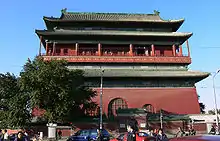Nanluoguxiang
Nanluoguxiang (Chinese: 南锣鼓巷; pinyin: nánluógǔxiàng) is a narrow alley that gives its name to an old part of the Beijing city centre with traditional architecture both new and old. The neighborhood contains many typical narrow streets known as hutong. It is located in the Dongcheng district.[1][2]
.jpg.webp) Nanluoguxiang in 2011 | |
| Native name | 南锣鼓巷 (Chinese) |
|---|---|
| Type | Hutong |
| Length | 800 m (2,600 ft) |
| Location | Dongcheng District, Beijing |
| Coordinates | 39°56′33″N 116°23′47″E |
| North end | East Gulou Street |
| South end | Di'anmen East Street |
The alley itself is approximately 800m long, running from East Gulou Street in the north to Di'anmen East Street in the south.[3]
History
Nanluoguxiang was built in the Yuan Dynasty and received its current name during the Qing Dynasty, around 1750. In recent years, the area's hutongs have become a popular tourist destination with restaurants, bars, live music houses, coffee shops, fast food and souvenir shops, as well as some old siheyuan associated with famous historic and literary figures. Nanluoguxiang Station of Beijing Subway opened in 2012 and is located near the south entrance of the alley.[4]
Gallery
 A traditional red Chinese door with Imperial guardian lion knocker, resemble number 8 (good luck or fortune) in Chinese culture
A traditional red Chinese door with Imperial guardian lion knocker, resemble number 8 (good luck or fortune) in Chinese culture Guang Hua temple (广化寺)
Guang Hua temple (广化寺) The nearby Drum Tower (鼓楼)
The nearby Drum Tower (鼓楼)
See also
References
- "南锣鼓巷". Bj.xinhuanet.com. 2006-08-15. Archived from the original on 2011-05-29. Retrieved 2012-10-29.
- "南锣鼓巷官方网站欢迎您!特色南锣鼓巷—胡同里的时尚元素". Nanluoguxiang.com. Archived from the original on 2012-06-08. Retrieved 2012-10-29.
- Nan Luo Gu Xiang. "南锣鼓巷 - Google Maps". Maps.google.com. Retrieved 2012-10-29.
- "Beijing: 10 Things to Do". Nanluoguxiang. Retrieved 28 January 2013.